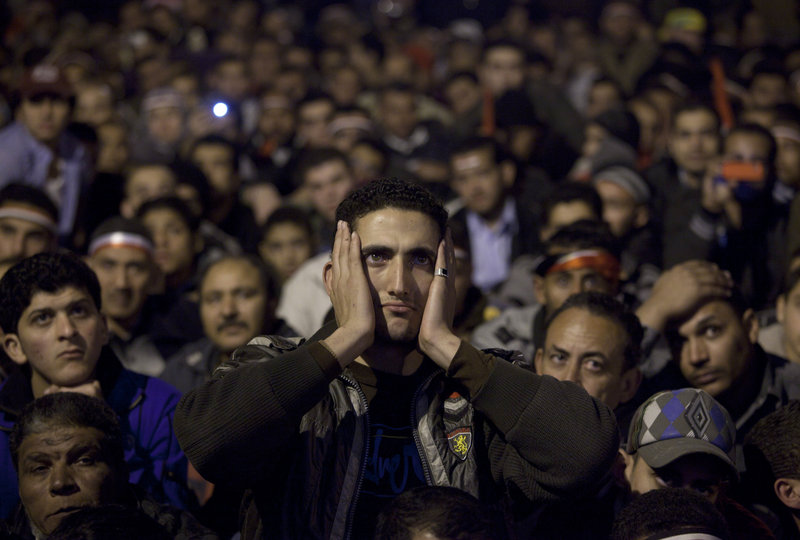CAIRO – They came for a celebration. They brought their children and their nephews and their cameras to revel in what they thought would be a defining moment in their nation’s history.
Instead, the tens of thousands of Egyptians who flocked to Tahrir Square Thursday night expecting President Hosni Mubarak to announce his resignation were stunned, some near tears, when he didn’t.
On a cool, clear night in downtown Cairo, a hush fell over the crowd. People tilted their heads toward speakers positioned throughout the square, as if trying to wish the words out of the 82-year-old president.
Afterward, there would be debate and confusion over what Mubarak meant when he said he’d delegated powers to Vice President Omar Suleiman. But in the square that’s been the center of 17 days of protests demanding that Mubarak quit, the words that the throngs were waiting to hear never came.
Eyes hardened, and heads shook. One man watching on a big screen took off his shoe and raised it toward Mubarak in disgust. Hundreds immediately did the same.
“He laughed at us,” said Mohammed Mamdouh, a teacher who brought his teenage nephew to what he thought would be a party.
“If he told me that the sun rises, I don’t believe him,” said Salah Shkeb, a lawyer from Mansour, 100 miles from Cairo, who rented an apartment in the capital to join the uprising.
Like many in Tahrir, Shkeb predicted that protests today would be the biggest yet. Minutes after the speech ended, hundreds of young demonstrators began marching out of the square and toward the state television headquarters, which for days has been guarded by tanks.
News reports said hundreds were marching in the direction of the presidential palace, about 10 miles east of Cairo, although the main road in that direction reportedly had been sealed off by the Egyptian army.
“In this square, tomorrow will be a big war,” Shkeb said. “We will go to the palace. He didn’t listen to us.”
Just moments earlier, perhaps the largest nighttime crowd to pack Cairo’s main square had been a festival, with people singing songs, snapping pictures and banging drums in anticipation. Egyptians of all ages and stripes stood shoulder to shoulder. A tall, clean-cut teacher argued passionately with a burly, bearded man in a skullcap about constitutional reform and who would replace Mubarak.
They told the same jokes: Mubarak meets former Egyptian presidents Gamal Abdel Nasser and Anwar Sadat in the afterlife. They ask him what did him in, poison or assassination?
“Facebook,” says Mubarak, a reference to social media’s instrumental role in organizing the uprising.
The raucous mood gave way to shock and cries of disbelief. When Mubarak opened by vowing to punish those responsible for the deaths of the people killed in protests — many at the hands of police and Mubarak loyalists — Shkeb looked nervous. When Mubarak said he’d never let foreign elements dictate the course of events in Egypt, Shkeb rubbed his eyes.
Toward the end, when Mubarak invoked his six decades of service to Egypt, first as a military man and then as head of state, the crowd jeered, “Leave! Leave!”
“Only lies,” Shkeb said. “For 30 years he’s been talking about the future. What is this future?”
Mohammed Abdul Magd, who brought his 3-year-old and 1-year-old daughters to experience “the history of their country,” was distraught after the speech. “I can’t answer you,” he said.
His wife, Zeinab Ahmed, said, “I was happy when I came here, but all my hopes collapsed.”
Send questions/comments to the editors.



Success. Please wait for the page to reload. If the page does not reload within 5 seconds, please refresh the page.
Enter your email and password to access comments.
Hi, to comment on stories you must . This profile is in addition to your subscription and website login.
Already have a commenting profile? .
Invalid username/password.
Please check your email to confirm and complete your registration.
Only subscribers are eligible to post comments. Please subscribe or login first for digital access. Here’s why.
Use the form below to reset your password. When you've submitted your account email, we will send an email with a reset code.